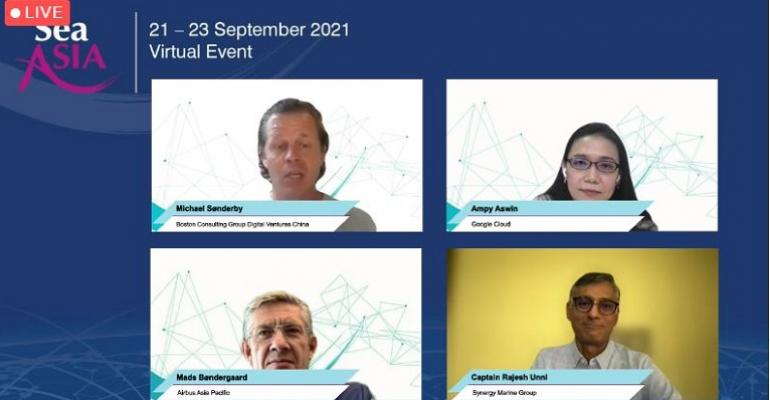Moderator Michael Sonderby, Managing Director and Partner for BCG Digital Ventures commented: “The technologies are only as good as their ability to reach scale. And it's really not about developing new technologies but rather the adoption of it at scale.”
Ampy Aswin, Director of Supply Chain and Logistics Industry Solutions APAC for Google, highlighted that information exchange in shipping was still highly manual and where technology is developed it is very much siloed.
“The challenge of the industry is how do we really enable a much more intelligent, and connected system that really allows, interoperability, traceability, and predictability, to help drive better planning and agility supply chains,” she said.
Capt Rajesh Unni, founder of Synergy Marine Group has a foot in both shipping directly as a major ship manager, and the development of technology for shipping through Alpha Ori. Capt Unni stressed the importance of understanding customer needs in developing use cases for technology.
“I think organising the information is key in the sense of how do you give the information that is relevant to your customer, which means that anything that you do you need to need to put the customer at the fore,” he said.
At the same time they had learned all customers have different needs and this is something you have to accept. This means that products need to adaptable.
Capt Unni gave the example of smartship platform that took thousands of datapoints from the ship in 30 seconds the company applied their ship operating experience to identify which datapoints to use. While customers liked the product those with ships on shorter periods said they needed a lite version. In a few months they were able to test and develop a lite version, which is now deployed on close to 500 ships.
However, products cannot be constantly customised so it is imperative to understand what will provide commercial value.
“The key is to build a good base, which you can then change and customise, but you cannot keep building different bases all the time, and I think scalability is definitely an issue,” Capt Unni said.
In a comparison with Google he said it was not enough just to have a good platform to gather data it needs to have apps that will drive the customer to use it.
For greater adoption of solutions Aswin from Google also saw an issue of trust between trading partners in the maritime industries, and a lack of resulting interoperability hampering efficiency of operations.
“The same goes with trade documentation, education, technology that facilitates blockchain and distributed ledger's that can facilitate that. I do see that there is still a need for industry standard for the public trust,” she said.
Copyright © 2024. All rights reserved. Seatrade, a trading name of Informa Markets (UK) Limited.
Add Seatrade Maritime News to your Google News feed.  |


